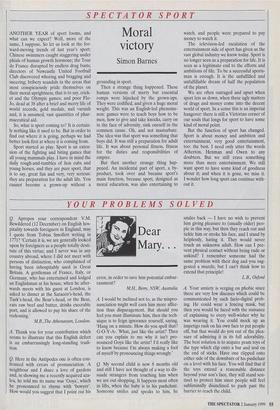YOUR PROBLEMS SOLVED
Q. Apropos your correspondent V.M. Bewildered (12 December) on English hos- pitality towards foreigners in England, may I quote from Tobias Smollett writing in 1771? 'Certain it is, we are generally looked upon by foreigners as a people totally desti- tute of this virtue; and I never was in any country abroad, where I did not meet with persons of distinction, who complained of having been inhospitably used in Great Britain. A gentleman of France, Italy, or Germany, who has entertained and lodged an Englishman at his house, when he after- wards meets with his guest at London, is asked to dinner at the Saracen's-head, the Turk's-head, the Boar's-head, or the Bear, eats raw beef and butter, drinks execrable port, and is allowed to pay his share of the reckoning.'
M.B.,The Athenaeum, London.
A. Thank you for your contribution which seems to illustrate that this English defect is an embarrassingly long-standing tradi- tion.
Q. Here in the Antipodes one is often con- fronted with errors of pronunciation. A neighbour and I share a love of gardens and, in showing me a recently acquired aza- lea, he told me its name was 'Goya', which he pronounced to rhyme with towyer'. How would you suggest that I point out his
Dear Mary.. .
error, in order to save him potential embar- rassment?
M.H., Berry, NSW, Australia A. I would be inclined not to, as the mispro- nunciation might well earn him more affec- tion than disparagement. But should you feel you must illuminate him, then the tech- nique is to feign ignorance yourself, saying, `Hang on a minute. How do you spell that? G-O-Y-A-. What, just like the artist? Then can you explain to me why it isn't pro- nounced Goya like the artist? I'd really like to know because I'm always making a fool of myself by pronouncing things wrongly.'
Q. My second child is now 8 months old and still I have not thought of a way to dis- suade strangers from touching him when we are out shopping. It happens most often in lifts, when the baby is in his pushchair. Someone smiles and speaks to him, he smiles back — I have no wish to prevent him giving pleasure to (usually older) peo- ple in this way, but then they reach out and tickle him or stroke his face, and I stand by helplessly, hating it. They would never touch an unknown adult. How can I pre- vent physical contact without being rude or unkind? I remember someone had the same problem with their dog and you sug- gested a muzzle, but I can't think how to extend that principle!
L.B., Oxford A. Your anxiety is verging on phobic since there are very few diseases which could be communicated by such facio-digital prob- ing. He could wear a fencing mask, but then you would be faced with the nuisance of explaining to every well-wisher why he was wearing it. You could mock up an impetigo rash on his own face to put people off, but that would do you out of the plea- sure of admiring it in its full adorability. The best solution is to acquire pram toys of the type which clip onto a bar and nod on the end of sticks. Have one clipped onto either side of the downbars of his pushchair on a level with his face. You will find that if the toys extend a reasonable distance beyond your son's face, they will stand sen- tinel to protect him since people will feel subliminally disinclined to push past the barrier to reach the child.


























































 Previous page
Previous page